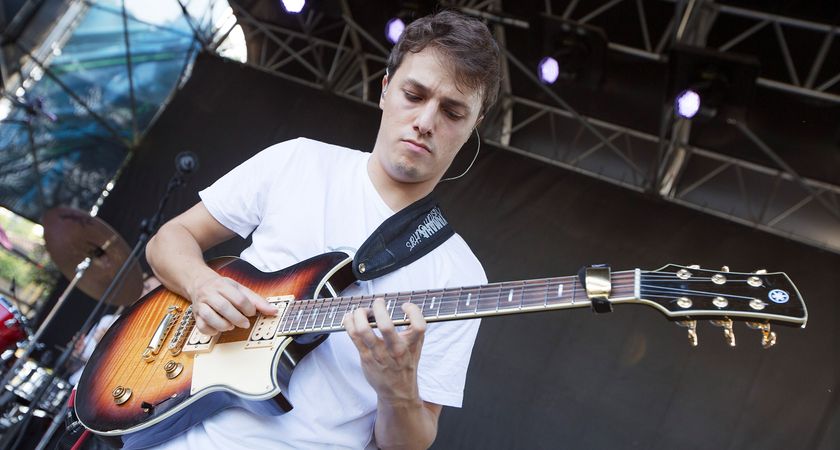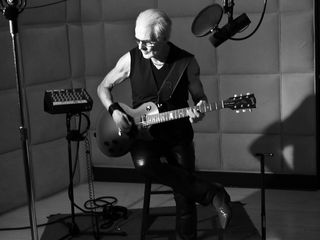
Michael Des Barres on Led Zeppelin, Power Station and The Key To The Universe
A lot of artists will have you believe that they never listen to their new albums once they've finished recording them. Veteran rocker Michael Des Barres isn't buying it. He's absolutely stoked about his new record, The Key To The Universe, and has it on repeat-play – and he's not shy when it comes to singing its praises.
“It’s supposed to be the cool thing to say, ‘I never watch my own movies’ or ‘I never listen to my own records,'" Des Barres says. "It’s such bullshit. Anybody who says that is unquestionably lying. I love listening to my new record. When you do something that’s good, you know it. I think my record is terrific. There’s nothing about it I’d like to change, and I don’t my saying so.”
The Key To The Universe sees the journeyman frontman – he's logged time with the bands Detective (once signed to Led Zeppelin's Swan Song Records) and the Power Station – and celebrated actor (he got his start playing a British tough in the classic film To Sir With Love and has turned in memorable appearances in MacGyver and Melrose Place, among others) reteaming with his onetime Silverhead and Chequered Past bandmate Nigel Harrison, who co-wrote the feisty track I Want Love To Punch Me In The Face, as well as tackling the sparkling Linda Perry-penned cut Can't Get You Off My Mind.
Des Barres sat down with MusicRadar recently to stroll down movie-and-music memory lane, and to talk about recording the album that he just can't get enough of.
It’s one thing to have been in swinging London, and it’s quite another to have made a film set in that period – To Sir With Love. Did you feel as if you were in the epicenter of the world?
“I guess so, but then I’ve always felt like I’m in the epicenter of the world. [Laughs] London at that time was a movie. It’s almost like somebody said ‘Acton!’ but they didn’t say ‘Cut!’ for 40 years. I was so young then – I was 16 years old – and I came from boarding school and was thrown into this world of velvet trousers, Sidney Poitier, and Wayne Fontana and the Mind Benders. It was surreal.”
The Mind Benders played during the dance sequences of To Sir With Love. Did you get to hang with them?
“I did. They were like every other bunch of working class rock ‘n’ roll musicians. They liked Chuck Berry and everything else that we liked. It wasn’t like talking to Nietzsche or something. They were regular dudes who had chosen their path. Working class, post-Second World War youth were listless and didn’t know what to do. When the blues somehow became the soundtrack to the British youth, thanks to people like the Stones and Alexis Korner, it was as if they suddenly had a real choice. Wayne Fontana and the Mind Benders were right there. They were great.
“That was my first actual contact with a band. Even though they were lip-synching for the film, it was exciting. I was already toying with the idea of, you know, ‘Hmm, I think I wanna do that…’”
That’s what I was going to ask: When did you make the decision to move a little bit away from acting and more into rock?
“In my head, I wanted to do it immediately after hearing Muddy Waters, like everybody else. But I was an actor and I was doing really well, so it would have been foolish of me to disappear into a band. What happened was, I did a musical in London, in 1969, called The Dirtiest Show In Town in which I played an androgynous rock star. Robert Stigwood produced it. Andrew Lloyd Webber saw me in it, and he got me a record deal. That’s how it started it.”
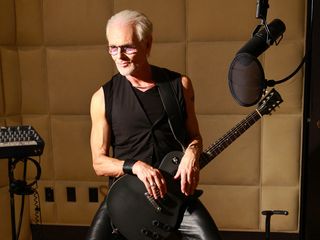
On partying with Led Zeppelin
Your band Detective signed to Swan Song Records in the ‘70s. With Led Zeppelin behind you, did you feel as though you were destined to make it?
“That’s hard to say. When you’re on heroin, ambition tends to disappear. I don’t mean to be frivolous about this, but we were so fucking stoned that we thought we’d already made it. ‘Making it’ is a difficult subject. I’ve come to realize that the process is the prize. I didn’t think about it in those days because there was no reason to. We were so high on playing and so high in general. [Laughs] We spend a year at the Record Plant making a record. We spent $100,000 on the snare drum sound. It was a different world.”
Any parties with the Led Zeppelin guys that we can’t print – but we will anyway?
[Laughs] “’Parties’ aren’t really the right word to describe the shenanigans of the inner sanctum of Led Zeppelin in those days. I can only allow your readers to use their imaginations and go Fellini on it.”
You go back a long way with Nigel Harrison. The two of you were together in Silverhead and Chequered Past, and now he's on your new record. What's the secret to your relationship?
“In retrospect, I love Nigel with all my heart. We’ve been together for many incarnations, and there’ve been many drugs under the bridge. We’ve seen each other in the best of times and the worst of times. It’s like A Tale Of Two Cities, only it’s a thousand cities. We’ve been on the road, been in bands; it’s been both playful and horrific. It’s very bonding when you go through those rock ‘n’ roll wars and battles.
“Nigel went on to tremendous success with Blondie and as a songwriter. I’ve always stayed in touch with him and have written with him. Having him come to Rome to do The Key To The Universe was a dream come true. We know each other so well, so there’s an honesty between us no matter what room we’re in.”
OK, recording in Rome. Aside from the fact that it’s, you know, Rome, why did you want to record there?
“Well, yes, because it is Rome, sure. I love that city, and I just wanted to be somewhere exciting and interesting – no traffic on La Cienga and no casting directors at the gym. I just wanted to be somewhere timeless and inspiring. Bob Rose, who produced this album, lives in Italy. He called me and asked me where I wanted to do it, and I said, ‘Rome, of course.’ [Laughs]
“He booked Morricone Studios – Sergio Morricone did all those sweeping scores for movies – and the place was terrific. The room was so big, and that gave us an enormous drum sound. We did the record analog, so between that and the big room, we got a tremendous recording. It’s a magic place.”

The Key To The Universe
What was it like working with Linda Perry? Do you have a history with her?
“Yeah, I know her really well. She’s an amazingly talented woman with more rock ‘n’ roll in her little fingers than most people have in their entire bodies. She’s a hard worker, which is what I am. It’s a beautiful thing to work with a woman who’s pragmatic and passionate. Those are two great qualities to put together. I love her song – it’s so obsessive, and I know a thing or two about obsession.” [Laughs]
Nice reference to your song Obsession. The single I Want Love To Punch Me In The Face – isn’t that a little harsh for a title?
“No, not at all. I had the title before I had a song for it. I do want love to punch me in the face, to wake me up. It’s as simple as that. It’s a great sentiment. Love should be forceful, and it should knock you out. Why not?”
Does the title of the album mean that you’ve somehow found ultimate enlightenment?
“There’s no question that over the years I’ve become more aware of myself and who I really am. The title of the album is a question. It’s whatever you want it to be. I wanted something that would get people talking – ‘You have the key to the universe, Michael? What is it? What is the key?’ ‘I don’t know. What do you think it is?’ Maybe it’s love or velvet trousers – I don’t know. It’s up to you. You could see it as pretentious, or you could see it as asking you to think about what would make your life better. Then it’s that, too.”
What was it like when you stepped into the Power Station? Was it daunting, or were you like, ‘Fuck it. I’m gonna stake my claim here”?
“It wasn’t that aggressive. It was great. I loved John [Taylor] and Andy [Taylor] and Tony [Thompson] – God rest his soul. What happened was, I had supported them when I was in Chequered Past, and we got along great, so when Robert Palmer didn’t feel he could do it, because he didn’t know if he could play to 20,000 topless girls, they immediately thought of me. [Laughs]
“I was in Marshall, Texas, the middle of nowhere, making a movie with Don Johnson when the promoter called me. Obsession was number one all over the world, and I was one very happy dude. They said, ‘Do you want to come to New York? There’s a band that needs a singer.’ They wouldn’t tell me who it was, only that there was a ticket waiting for me. So I went to New York and saw a big white stretch limo waiting for me. I got in and was taken to an office – there inside were John and Tony, sweating profusely."
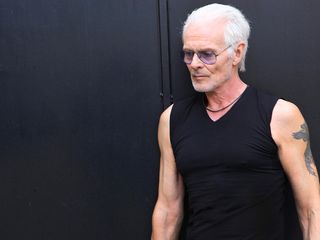
Getting the Power Station gig
“The tour was booked, but they didn’t have a singer. They gave me the album with and without Robert’s voice. I got on the Concord and went to London, and there I met Andy Taylor. Well, not at first – I had to wait eight hours for him. He arrived at a studio with two bodyguards in a billowing cloud of marijuana. [Laughs] I set it up where I could do Get It On, a verse and chorus. I did that, and Andy got on the intercom and said, ‘Let’s go shopping!’ So we went shopping.
“I got back on the Concord and went back to New York, checked into the Carlyle Hotel. We were supposed to start rehearsals in three days. The following morning I got a call from my manager, Danny Goldberg, who said, ‘You’re out. It’s over. Robert’s gonna do the tour.’ Bummer.
“Don Johnson came to town and we went out to dinner at Indochine. Who was in the place? John Taylor. Don went over to John and took him outside. I don’t know what was said; all I know is that I went back to the hotel, I packed, and at seven A.M. the phone rang. It was their manager telling me, ‘You’re back in.’ Robert got a piece of the merchandise and I went on the road.”
Acting and music – has one had to sometimes take a back seat to the other?
“The thing about it is, I just love to express myself. I love acting, but I love music, too, so I don’t want one without the other. A few years ago, Nigel and I went to Tokyo and did some Silverhead shows, and it reminded me how much I loved live rock ‘n’ roll. When I came back and I was doing a series, that’s when Bob called me and said, ‘Listen, let’s go make a guitar-based rock record.’ It happened so perfectly.
“In terms of how I juggle it, it’s been a mish-mash. I’ll do this and I’ll do that, and I’ll just say, ‘Yes.’ I advise any young musician or any young actor to say ‘yes’ to anything, until you can say ‘no.’”
Michael Des Barres' The Key To The Universe can be ordered via Amazon and iTunes.

Joe is a freelance journalist who has, over the past few decades, interviewed hundreds of guitarists for Guitar World, Guitar Player, MusicRadar and Classic Rock. He is also a former editor of Guitar World, contributing writer for Guitar Aficionado and VP of A&R for Island Records. He’s an enthusiastic guitarist, but he’s nowhere near the likes of the people he interviews. Surprisingly, his skills are more suited to the drums. If you need a drummer for your Beatles tribute band, look him up.
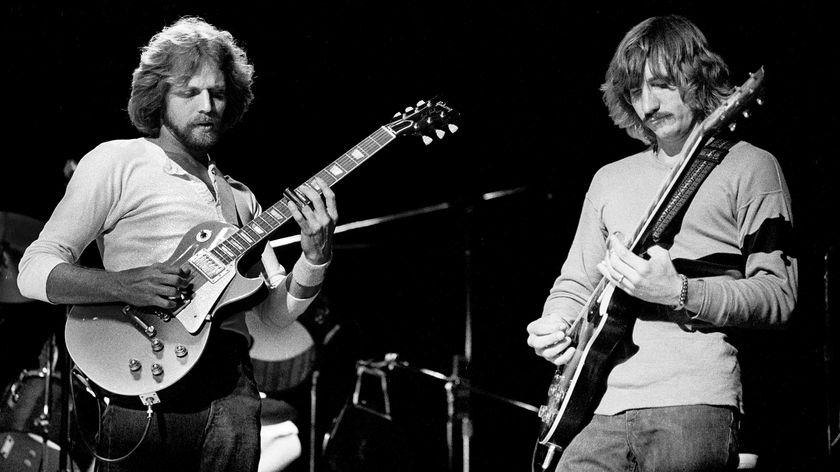
“The solos were not planned, they were spontaneously playing off of each other. We were really good at that": Joe Walsh tells the story of the Hotel California solo
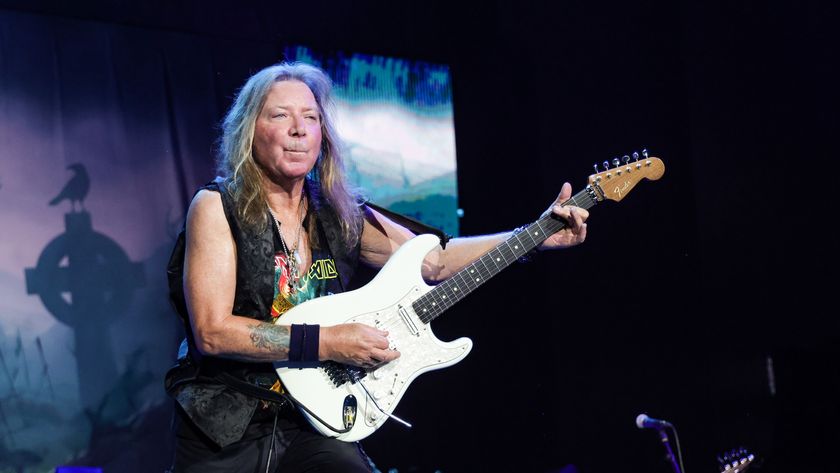
“There's a time and a place to bail out with dignity and grace - and not just flog a dead horse”: Iron Maiden guitarist Dave Murray says the band will split before they end up embarrassing themselves

“The solos were not planned, they were spontaneously playing off of each other. We were really good at that": Joe Walsh tells the story of the Hotel California solo

“There's a time and a place to bail out with dignity and grace - and not just flog a dead horse”: Iron Maiden guitarist Dave Murray says the band will split before they end up embarrassing themselves
Most Popular







